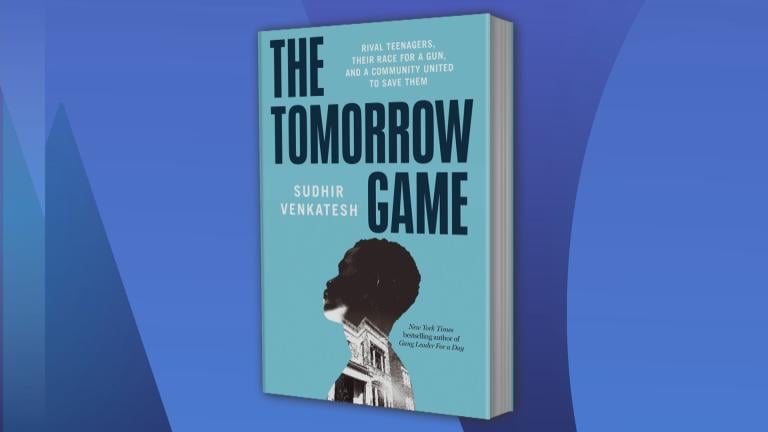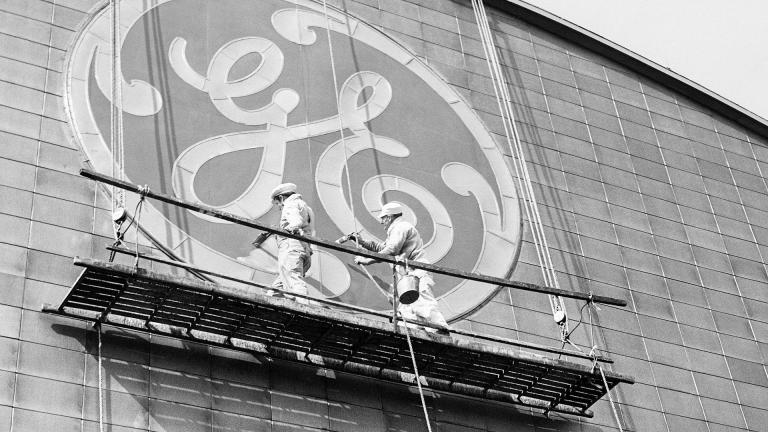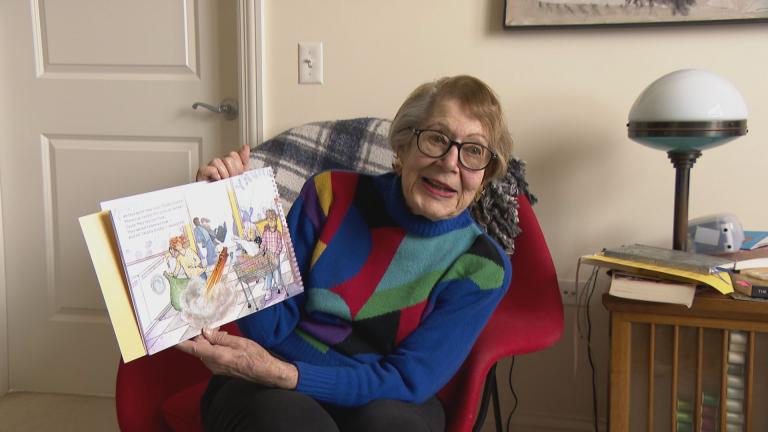As a boy, Derek Black was surrounded by active, outspoken white supremacists. His father, Don Black, created the prominent website Stormfront; his godfather was former KKK grand wizard David Duke. By age 19, Black was hosting a radio show and was a rising figure in the white nationalist movement.
But his ideology unraveled when he went to college. Black continued his racist and anti-Semitic activities underground, but was “outed” by a fellow student. Protests followed, and then Black was invited by an Orthodox Jew to Sabbath dinners. The conversations he had during these dinners, with people he had for years espoused hatred for, began to change him. He became friends and later romantic with a Jewish woman at the dinners.
 Today, Derek Black is a graduate student at the University of Chicago. (Courtesy of Penguin Random House)
Today, Derek Black is a graduate student at the University of Chicago. (Courtesy of Penguin Random House)
In 2013, Black publicly renounced his white supremacist views and began speaking against them.
Black’s story is told in Pulitzer Prize-winning reporter Eli Saslow’s new book, “Rising Out of Hatred, The Awakening of a Former White Nationalist.”
Saslow, a Washington Post staff writer, joins us in discussion.
Below, an excerpt from “Rising Out of Hatred.”
1. “The Great White Hope”
The Klansmen and neo-Nazis arrived for their meeting in the fall of 2008 dressed in suits with aliases written on their name tags and began sneaking into the hotel just after dawn. They walked past the protesters waving rainbow flags on the sidewalk, past the extra state troopers stationed outside the hotel lobby, past the FBI informants hoping to infiltrate their way inside. For several days, the government of greater Memphis had been working to prevent this “white rights conference” from taking place. One suburb declared a state of emergency so it could hire additional police officers; another issued a temporary ban on all public gatherings. But by 7:00 on Saturday morning, about 150 of the world’s preeminent white nationalists had gathered inside a nondescript hotel conference room where a small sign hung on the wall.
 “The fight to restore White America begins now,” it read. The United States had elected its first black president just four days earlier, and already the Department of Home- land Security warned of a “significant spike in activity” on the white racist fringe. President-elect Obama was receiving an average of thirty death threats each day. Gun sales had skyrocketed to historic levels, and by some reports far-right militia groups had tripled their membership numbers during the last year. But the white uprising that concerned the Department of Homeland Security most of all was the one beginning now in Memphis, where acoustic guitar played through the speakers and sack lunches with turkey and swiss waited on a buffet table. “It’s the polite face of the racist movement that now has a chance to recruit new members and broaden in scope,” one DHS analyst said.
“The fight to restore White America begins now,” it read. The United States had elected its first black president just four days earlier, and already the Department of Home- land Security warned of a “significant spike in activity” on the white racist fringe. President-elect Obama was receiving an average of thirty death threats each day. Gun sales had skyrocketed to historic levels, and by some reports far-right militia groups had tripled their membership numbers during the last year. But the white uprising that concerned the Department of Homeland Security most of all was the one beginning now in Memphis, where acoustic guitar played through the speakers and sack lunches with turkey and swiss waited on a buffet table. “It’s the polite face of the racist movement that now has a chance to recruit new members and broaden in scope,” one DHS analyst said.
David Duke, the conference organizer, stepped behind a podium to welcome his guests. Duke, then fifty-eight, had spent his life working to push the white supremacist movement from the radical fringes ever closer to the far conservative Right, rebranding himself from an Imperial Wizard of the Klan into a self-described “racial realist” politician who nearly became governor of Louisiana in the early 1990s. He was two decades removed from the pinnacle of his international fame, and he’d tried to hold time in place by repackaging his old speeches into YouTube rants. He wore the tired look of a performer who’d stayed on tour too long, but he was still the public face of white nationalism. “The future of our movement is to become fully mainstream,” Duke told the crowd, so he’d reserved one of the conference’s keynote speeches for an up-and-coming white nationalist leader who represented that future.
“I’d like to introduce the leading light of our movement,” Duke said. “I don’t know anybody who has better gifts. He may have a much more extensive national and international career than I’ve had. Derek, can you come on up?”
Duke motioned to the corner of the room, where a nineteen- year-old community college student was hunched behind a laptop, running a live radio broadcast of the event for the online radio station he started himself.
“We are so privileged to be with you,” Duke said, before turning back to the audience. “Ladies and gentlemen, here is Derek Black.”
The crowd began to applaud, and Derek stood from his computer with a slight wave and walked to the front of the room. Most of the white nationalists already knew him, because how could they not? He was at least a generation younger than almost everyone else, with shoulder-length red hair and a large black cowboy hat that he wore in an effort to make himself more memorable. He’d grown up within the insular world of white nationalism, attending dozens of conferences just like this one. Already he’d built his own web- site for “white children of the globe,” visited more than half a million times. He’d launched a twenty-four-hour online radio network for white nationalists and won a local election as a Republican in Florida. He was not only a prodigy within the movement but also a product of it. His father, Don Black, led the Klan for nearly a decade and then created Storm- front, the internet’s first and largest white pride website. His mother, Chloe, had once been married to David Duke, and Duke acted as Derek’s mentor and godfather, sometimes referring to Derek as “the heir.”
No family had done more to help white nationalism bully its way back into mainstream politics, and Derek was the next step in that evolution. He was precocious, thoughtful, and polite, sometimes delivering handwritten thank-you notes to conference volunteers. He never used racist slurs. He didn’t advocate for outright violence or breaking the law. His core beliefs were the same as those of most white nationalists: that America would be better off as a whites- only country, and that all minorities should eventually be forced to leave. But instead of basing his public arguments on emotion or explicit prejudice, he spoke mostly about what he believed to be the facts of racial science, immigration, and a declining white middle class. Five evenings each week, he hosted an online radio show, often devoting the first half hour to innocuous stories about his favorite country musicians like Waylon Jennings, Alan Jackson, and Johnny Cash before turning the conversation to “the survival and continued dominance of the great white race,” he said. His goal, he explained once on the radio, was to “normalize these white nationalist ideas that already fit so neatly within the divides of modern society.”
“I’ve never lived in a country that I consider to be a white country,” he told the audience in Memphis. “I’ve never enjoyed this good golden bag of advantage that white people are supposed to have.”
He told the audience about his recent campaign to become a Republican committeeman in Palm Beach County, Florida, in which he had traveled door-to-door to meet with voters each afternoon after his community college German class. He seldom mentioned race in those conversations, and sometimes he barely spoke at all. Instead, he mostly listened as his white Republican neighbors told him about the reasons they felt their culture was under threat: the new highway signs in Spanish, urban crime, outsourced middle-class jobs, a collapsing economy, and a societal insistence on political correctness. For the first time in history, less than half of all babies born in the United States were white, and Derek believed whites would inevitably begin voting more explicitly for their interests like a typical minority bloc. “Most white people don’t want to be called racists, but they do want to make sure their culture and their position in society isn’t going to be undermined,” Derek said on the radio. “People are just waiting for white candidates to come along who are brave enough to talk about these things, and when that hap- pens, whites will go streaming to the polls.” Even though he had campaigned as a teenager with no job history, no college diploma, and zero political experience, Derek beat out a Cuban American incumbent and won the election with more than 60 percent of the vote.
“The way white people have to respond is through politics,” Derek told the crowd in Memphis. “Which way are the Republicans going to go? I’m kind of banking on them staking their claim as the White Party. We can infiltrate. We can take the country back.”
A few people in the audience started to clap, and then a few more began to whistle, and before long the whole group was applauding. “Our moment,” Derek said, because at least in this room everyone was in agreement. They believed the core tenets of white nationalism were about to drive a political revolution. They believed, at least for the moment, that Derek would help lead it.
“Years from now, we will look back on this,” he said. “The great intellectual move to save white people started today.”
The applause continued as Don Black, fifty-five, stood from the rows of folding chairs and moved slowly toward the lectern to join his son onstage for the next session of the conference, an audience Q&A with white nationalist leaders. Don had suffered a hemorrhagic stroke a few months earlier, and now he walked with a hunch and leaned against a cane to steady his debilitated left side. He had long prided himself on being the embodiment of physical and emotional toughness—what he called the “European ideal written into our genes.” He stood over six feet tall, with thick gray hair, a hard jawline, and blue eyes. He had once been the strongest weight lifter in the rec yard of a federal prison, but now the short walk to the lectern required intermittent breaks, until Derek stepped out and offered his hand.
Don had been leaning on his only child more than ever lately, relying on him for rides to white nationalist meetings and help managing the growing business of Stormfront, which crashed under the weight of a record 120,000 users on the night of Obama’s election to the presidency. Most of all, Don looked to Derek’s recent political achievements to lift himself from stretches of depression and fatigue that he’d endured since his stroke. He had tried to heal himself with physical therapy, experimental electrotherapies, and a dozen nutritional supplements, but none of it was as efficacious as monitoring Derek’s rising fame in the local newspaper and listening to him talk each night about “racial realities” on internet radio.
“I never thought it would feel so good to play second fiddle in my own house,” Don joked in Memphis as he and Derek took their places on the stage.
Sometimes, standing eye to eye with Derek, Don marveled at the young adult his son was becoming. “So perceptive. So insightful and committed in his beliefs,” Don said. At first those beliefs had come as a direct inheritance from Don. He sent six- year-old Derek out for Halloween dressed as a white Power Ranger, helped to decorate his childhood bedroom with a Confederate flag, and brought him to speeches where Don expressed doubt about the full severity of the Holocaust. Derek was socialized on Stormfront, and he began spending his nights in the private chat rooms as soon as he could type. After Derek finished third grade, Don and Chloe pulled him out of school, believing the public system in West Palm Beach was overwhelmed by an influx of Haitians and Hispanics. “It’s a shame how many white minds are wasted in that system,” Derek wrote then, at age ten, on his own children’s web page. “I am no longer attacked by gangs of non- whites. I am learning pride in myself, my family and my people.”
Related stories:
Former Skinhead Writes of His Descent Into Hatred, and How He Got Out
Michael Eric Dyson on ‘Our Unfinished Conversation About Race’
History or Hate? Chicago’s Controversial Monuments and Street Names








